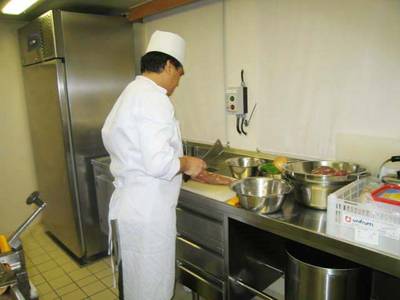New Courses Fill Catering Knowledge Gap
A survey of officers and crew by a leading tanker owner suggests catering and galley staff throughout the industry may be in urgent need of training, according to Seagull.
The computer-based training provider draws attention to a thorough survey of all ranks undertaken by Finaval S.p.A, a tanker owner, in cooperation with CIRM (International Radio-Medical Centre Rome) and UNICAM (Centre for Clinical Research, Telemedicine and Telepharmacy, Camerino University) focusing on knowledge and understanding of food hygiene and food handling best practice. Surprisingly, catering is the staffing group identified as “the least informed about the subject matter for the majority of questions, or is certainly not the most informed,” the survey said.
“The Maritime Labor Convention 2006 has explicit rules covering food and catering to ensure that seafarers have access to good quality food and drinking water under regulated hygienic conditions,” said Anders Brunvoll, Seagull Senior Course Instructor. “However, this detailed survey suggests that there is considerable work to be done so that the relevant staff are suitably trained.”
Shortcomings were found in even the most basic knowledge. Catering staff provided the highest proportion of “No” answers to the question “Do you think that diseases can be transmitted through food?” The survey also suggests only 52% of catering and galley staff are aware that food may be responsible for disease transmission, while more than 30% confirmed their lack of knowledge by skipping the question.
The deeper problem is demonstrated by findings that 88% of catering staff got the storage temperature of dairy products (below +4oC) wrong, 20% believed refrigeration helped germs to grow, 35% thought hazardous foods always had a bad taste or smell, and 48% thought refreezing thawed food was not a problem. Overall, catering staff proved to be among the least likely to identify the symptoms of foodborne illness.
“Tools ensuring that catering staff are properly trained for their positions are critical for shipowners, but also for the rest of a ship’s crew working alongside those handling, storing and serving their food,” Brunvoll said.
“Based on the survey, Finaval has identified specialized knowledge verified through documentation or ad hoc testing as a key training objective for catering staff. The shipowner believes this is also an appropriate opportunity for Seagull to highlight its distance learning CBT # 220-223 courses, which include introductory modules through to advanced rank-specific training. Seafarers face rigorous training and have a right to expect rigor on hygiene from their galley and catering ship-mates.”
In all cases, Seagull’s distance courses on food hygiene emphasize the importance of safe and effective food handling related to food poisoning and precautions necessary to avoid them.
“Those directly involved in preparing food benefit from additional training covering the importance of nutritional and dietary requirements, and the need to serve balanced meals,” Brunvoll said. “However, raising awareness and embedding knowledge can be just as important for the mess man and the galley boy.”
seagull.no














